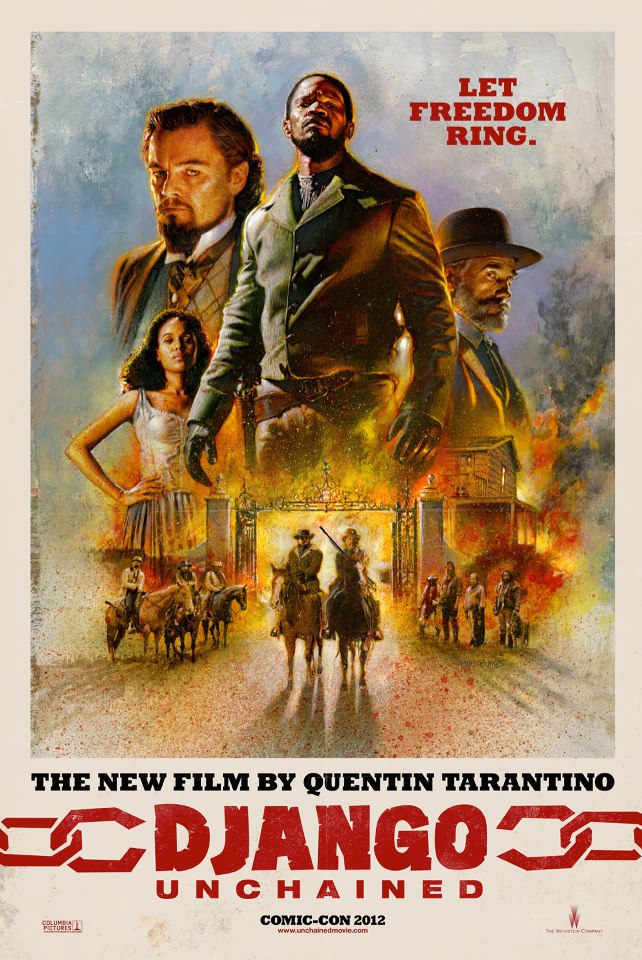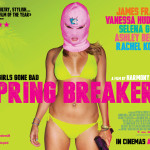Originally published on Examiner.com on December 29, 2012
In the fastest cinematic 165-minutes this side of “Cloud Atlas,” Quentin Tarantino has ridden back into town with his latest explosive and (as per usual) controversial film, this time set in the old 1850s South, a grand mash up of 1960s spaghetti westerns and 1970s blaxploitation slave narratives, sprinkled with modern music and drenched with enough fake blood to fill Shamu’s biggest water tank. Equally thrilling and appalling, “Django Unchained” exists as a film unlike any other, a monumental work of art that has left a swath of ardent lovers and haters in its wake.
The story is sprawling, as Django goes from a downtrodden and beaten slave afraid to look another man in the eyes to a bad ass, gun wielding, tough as nails bounty hunter over the course of at least a long winter and the spring, finding himself empowered by a pistol and the criminal justice system (conservative Republicans should absolutely love this aspect). And of course the whole time he has his eyes set on his prize, the opportunity to retrieve his wife from the hellhole that is Candyland and to simply live happily ever after. Django isn’t trying to overthrow the whole of slavery, nor does he want to cut down every white man he sees; he just wants what any person in this world wants, the opportunity to be happy and live his life in peace with the one he loves. Of course now this seems like something many of us take for granted, but in the southern US in 1858 this was a pipe dream for many people solely because of the color of the skin, and for Django this is the ultimate prize, the ability to simply live his life without fear.
“Django Unchained” has all the hallmarks of a typical Tarantino joint. The verbose dialogue is in full effect, and outside of Samuel L. Jackson, no one delivers Tarantino’s words like Christoph Waltz, as he has the same ability as Jackson to make Tarantino’s very particular brand of cinematic speaking come across as his own words, instead of sounding like the hyper stylized dialogue that it actually is. Tarantino also has a knack for rounding out his casts with superb actors, so in addition to both Waltz and Jackson doing what they do so very well, Foxx totally nails Django and successfully portrays the transformation from a meek and beaten down man to master of his own domain, and DiCaprio plays a character far more sinister and despicable than he has every done before and does so with great aplomb, as he seems to relish the opportunity to finally play someone so outright evil and dastardly as Calvin Candie. And playing the smaller parts are people like James Remar, M.C. Gainey, Don Johnson, Jonah Hill, Walton Goggins, Tom Savini and Bruce Dern, as well as Tarantino regulars Zoe Bell and the always watchable Michael Parks. Pretty much everywhere you turn there is someone being great, like when original “Django” actor Franco Nero makes a pretty sweet cameo (one surely lost on over 90% of the audiences seeing this movie).
And then of course the entire soundtrack for this movie is just as good as it gets, as Tarantino has always been a master of re-appropriating both pop songs and songs from other film scores for his own purposes. So whereas someone else would think that a brutal spaghetti western would not benefit from Jim Croce tunes, Tarantino places one front and center. And really, how big are this guy’s balls that he actually used the live recording of Richie Havens’ “Freedom” from Woodstockfor this movie, and how amazing is it that it actually works so damn well? And while hip-hop would normally feel needlessly anachronistic for a film set in the middle of the 19th century, Rick Ross’ “100 Black Coffins,” written and produced specifically for this movie at the request of Jamie Foxx, fits so perfectly with the movie itself that it hurts.
Finally there’s Tarantino’s trademark violence, which goes back through each and every one of his films, and just when the ridiculously bloody “Kill Bill” and the insanely violent “Inglourious Basterds” seemed like the pinnacle for how far he could push cinematic violence, along comes “Django Unchained” with it’s jet-powered squibs creating the biggest explosions of blood and viscera ever seen in a movie like this. Starting with the opening scene, when someone gets shot they don’t just get shot and there isn’t just a little puff of blood mist – no, instead there are geysers of thick, viscous blood, as people literally explode when they are shot, with viscera literally coating the walls. Of course much of this violence is hard to watch, especially the recreations of what happened to slaves and how incredibly poorly they were treated, and these violent actions against the slaves don’t need exaggeration as they are horrible all ready, and there is a great possibility that this particular stuff might have even been pulled back a bit to save the audience a bit. While Tarantino definitely wants you to see that slaves faced dangers like being torn apart by vicious dogs, he mercifully only shows something like this in snippets and in tight close ups, not rubbing the audiences’ noses in this extreme violence because he knows we get it and he knows that we know it’s horrible. This entire film walks a tricky tightrope between giving the audience the cathartic violence that it wants and not going overboard with the terrible violence against slaves whose only sins were being born black and in this time period.
There are also the comedic aspects of the film, which itself would throw some people who would wonder why a movie about slavery in America would have any humor or comedy in it at all. But in this case it feels like the comedy is almost necessary, because with the story that Tarantino sets out to tell, there are a lot of gruesome and horrible things involved, and at almost three hours, is there anyone out there who wants to see such a long, brutal, hard movie with no relief in sight? So right away in the opening scene, mostly through dialogue and characters’ reactions to each other, there is humor, used to lighten the proceedings just a little. And at times the comedy was used to subvert some evil iconography that we are used to seeing, as in a scene in which a large group of pre-KKK regulators don masks in order to round up and kill Schultz and Django, only to spend five minutes bitching about said masks and how poorly they were made, rendering them blind. In this instance Tarantino used humor to undermine these racist, violent idiots, showing them to be a bunch of moronic whiners while they see themselves as superior.
This does lead us to the nationwide discussion of the point of this movie, that is to say, why did Tarantino feel the need to make this movie in the way that he did. Because while he did make a movie that prominently features the slavery system that we here in America are so quick to pretend never happened, he also made a movie that is unabashedly entertaining, and this has rubbed some people the wrong way. Most famously filmmaker Spike Lee, himself an incredible talent and a very intelligent person, has publicly boycotted the movie, insisting he would not see it because he does not appreciate Tarantino appropriating the history of his ancestors for a movie like this.
But is this fair? Setting aside the fact that Spike Lee has not actually seen the movie and insists on judging it without seeing a single frame (which is extremely silly and wrong headed), he is indeed entitled to his opinion that he does not want to see slavery turned into entertainment. But does this mean he doesn’t want to see any movies at all involving slavery? Surely there are people who would definitely prefer this, because there are people who do not want to be reminded that their great-great-great-great grandparents were despicable, racists, dehumanizing, bigoted, moronic assholes. But this can’t be preferable. There is no way Spike Lee wants filmmakers to ignore this horrible period of history, so that means the alternative is to only make movies about slavery that are deathly serious from start to finish. Basically more “Amistads” and “The Color Purples” and “Roots” because apparently slavery is that much off limits that it can only be approached from a purely intellectual standpoint, at an emotional distance, and without a trace of entertainment.
Of course this is ridiculous position for any filmmaker to take, because why does Spike Lee believe that Tarantino cannot make an entertaining movie about racism in the 1850s, but believe that he should be allowed to make entertaining movies about racism in the 1980s? “Do the Right Thing” and “Jungle Fever,” among other Spike Lee movies, are explicitly about racial tensions between different groups of people, and both movies are very entertaining while also showing some horrible stuff, so why does Lee believe that he can make a movie about racism and not Tarantino? It is because Tarantino is white and Lee thinks that only black filmmakers can make movies about black people? Because that itself is a racist idea, claiming that this time of history can only be explored by black artists. And this also ignores the fact that slavery and racial segregation is not the sole province of the American people, as this goes back to the beginning of time. For centuries and centuries, whether it be Jewish people enslaved by Egyptians or white Christians being thrown to the lions by the Romans for sport, large groups of people have been shitting on other large groups of people for superficial reasons. It is bullshit, it’s horrible, and worst of all, it’s life.
And that’s always been what movies have been about, a reflection of the human experience, as seen through the prism of the eyes of the filmmakers. And oppression is a universal experience, whether it be racially-based, economically-based, or otherwise. Since this terrible aspect of the human experience is indeed a large part of life, whether we like it or not, it needs to be reflected in our art, and this art should not be restricted to certain races or groups of people, because that itself is a prejudicial concept. So while “Django Unchained” does deal specifically with the American slavery system of the 1800s, the themes of the film extend to the terrors of human existence in general. In a movie where living black men are sold for hundreds of dollars while dead white men are sold to the criminal justice system for thousands of dollars, it is easy to see the message that to many people life is cheap and the lives of those different from us are even cheaper, and this is absolutely not relegated to this one time period.
Despite being enormously entertaining, the best thing about Tarantino’s “Django Unchained” is how it has fostered such discussions and debates such as this, not only among people like Spike Lee who haven’t seen the movie (and really whose opinions need to be taken with a big grain of salt due to their admitted lack of knowledge on the specifics of the content of the film itself), but among the many who have seen the movie, as the interwebs is now littered with both thoughtful and inane opinions of what this movie means and how it fits into the larger cultural landscape. When a daring and bold piece of art like this is unleashed and it makes people actually talk about its impact and the content of the film itself, that is a win for everyone involved. We should all be so lucky to get one movie a year like this that inspires so much debate, and in the end, love this movie or hate it, we are all the better for it because of it has inspired. That is the mark of a great film.


 Review: ‘Cheerleader’
Review: ‘Cheerleader’ Review: ‘Krampus’
Review: ‘Krampus’ FFF 2015 Movie Review: ‘Wildlike’
FFF 2015 Movie Review: ‘Wildlike’ Review: ‘Spring Breakers’
Review: ‘Spring Breakers’
Leave a Reply
You must be logged in to post a comment.